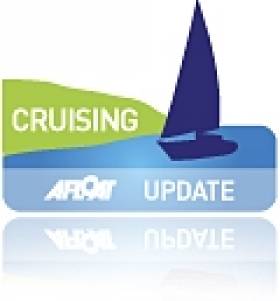Displaying items by tag: Donegan
Historic Trophy for South Pacific Dream Cruise
Fergus and Kay Quinlan live in the Burren in County Clare, and in 1997 they launched the steel van de Stadt 12-metre cruiser Pylades, which they'd built themselves. They've made several voyages and have been in the Irish Cruising Club's award list before. But at the ICC's AGM in the National YC on February 18th they deservedly got the big one, the Faulkner Cup, for the first stage of a global circumnavigation which began from their home port of Kinvara in the summer of 2009, and a year later they'd reached Tahiti.
Their cruise continues, so the award was made in absentia. Adjudicator Brian Cudmore of Cork made the point that their informative log included much general and often entertaining information, and it becomes even more interesting the further you got into it, so he's keenly anticipating the next inmstalment.
The Strangford Cup for an alternative best cruise could not have been more different, both in location or boat type. The 44ft Young Larry may have been built of steel in 1995, but she was based fairly precisely on the design of a gaff cutter built in 1907. And though the rig has been made more manageable through being a yawl, even the mizzen is gaff-headed, while the main sets a topsail. Not the most-easily handled rig for challenging seas, you might well think, but Maire Breathnach (originally from Dungarvan) and her partner Andrew Wilkes, crewed by Maire's niece Sibeal Turraoin, took Larry Og – which looks for all the world like a smaller Asgard I – right through the Northwest Passage to Alaska, an extraordinary one-season achievement.
The ICC members logged some other notable Atlantic voyages, with Michael Coleman of Cobh, a Port of Cork Pilot before he got the free bus pass, making a fine Atlantic triangle to the Azores, then Newfoundland, and so home to Cork, visiting many islands with his well-found 1988 Oyster 53 Oyster Cove. It was all done with a crew of average age 66, senior member Tom Noonan aged 76, and worthy winners of the Atlantic Trophy.
Over the years since its foundation in 1929, the Irish Cruising Club has become the trustee and adjudicator of many trophies, twenty in all, and two of them were special presentations in 2010. The Donegan Memorial Trophy went to Ruth Heard, an ICC member since 1967. She has cruised both to the Azores and Iceland, but is honoured this year in celebration of her remarkable contribution to the rebirth of the inland waterways, and to mark the re-opening of the Royal Canal. Ruth Heard was on the crew of Harklow, the last boat to transit the Royal in 1954 before its half century of official closure which was gloriously reversed in 2010.
And once upon a time, the ICC was the organiser of Ireland's Admiral's Cup campaigns. Though many members still race offshore as individuals, the club has long since focused totally on cruising. But it has a general trophy, the John B Kearney Cup for Services to Irish Sailing, and for 2010 it was awarded with acclamation to the successful Irish Commodore's Cup Team.
- Faulkner
- Cruise
- Cruising
- Cup
- Club
- Quinlan
- Kay
- Fergus
- ICC
- National
- yacht
- cub
- YC
- Cudmore
- Cork
- Breathnach
- Alaska
- Asgard I
- Strangford
- Burren
- Pylades
- Northwest
- Passage
- Wilkes
- Sibeal Turraoin
- Coleman
- Atlantic
- Cobh
- Newfoundland
- Oyster Cove
- Oyster
- Donegan
- trophy
- Ruth Heard
- John B Kearney
- Cup
- Commodore's
- gaff
























































